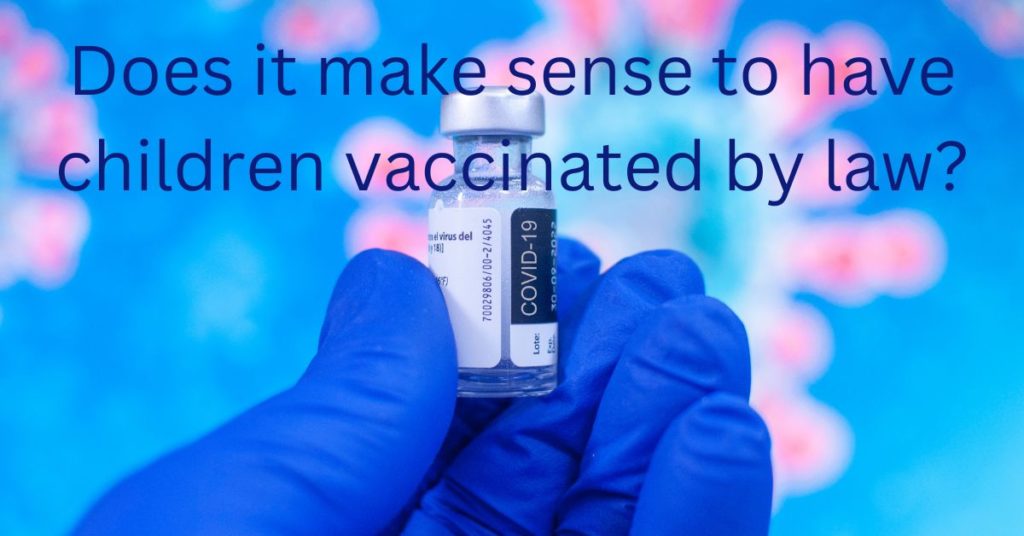Should I vaccinate my child?
In today’s medicine, it is established that vaccinations for children should only be carried out with the parent’s consent. But many parents have doubts about having children vaccinated by law because there are many critics of them in the media. That is why today many children remain without vaccinations in a world where many dangerous viruses and bacteria exist. I try to answer the question:
- Why do parents refuse vaccinations?
- Does it make sense to regulate vaccination by Low?
I will inform you about vaccinations and childhood diseases: how do the vaccinations work in children, World Health Organization (WHO) recommendations, the threat situation with infectious diseases today, and how was it in the past? I will give you arguments for and against the statutory vaccination requirement. Finally, I will express my own opinion on this subject.
The WHO recommends that infants receive vaccinations immediately after birth until puberty. The child is injected with a syringe containing dead viruses or bacteria during immunization. The child’s immune system reacts and forms antibodies that protect the child.
According to the Standing Vaccination Committee STIKO (Robert Koch Institute, Berlin), the vaccination schedule for children (2022) includes around 14 vaccinations (rotavirus, tetanus, diphtheria, pertussis, Hib (H. influenzae type b), poliomyelitis, hepatitis B, pneumococci, meningococci C, meningococci B, measles, mumps, rubella, varicella, HPV human papillomavirus). In the past, only 6-7 vaccinations were standard and all compulsory. It was fewer vaccinations and no outbreaks of infectious diseases. What do we have now? Nowadays, there are many contagious disease outbreaks and many recommended vaccinations that parents refuse.
I want to report on an important point – collective immunity or vaccination rate. The investigations show the need for a vaccination rate of 95% in the population. That means if about 95 percent of the population is vaccinated against infectious diseases, the remaining 5% will not get infected because collective immunity works.
Back when vaccinations were mandatory for all children, children were fully vaccinated (more than 95% of the population), and serious infections such as smallpox, poliomyelitis, and tuberculosis were almost eradicated from Europe. But today is very different. Today only about 70% of children in Europe are vaccinated. This is not enough to control infection. That is why around 400 children die from measles every day worldwide. According to German statistics, in 2019, in Europe, 90000 people contracted measles.
Now I come to the argument against compulsory vaccination.
For the past 20 years, critics in the media have claimed that vaccines are harmful to health. But these claims have no scientific evidence. In addition, the new “modern” vaccines are not well tolerated. Let’s take a look: at what’s in the vaccines – a lot of stabilizers, neutralizers, preservatives, antibiotics, dyes, etc. These new multi-component vaccines, with which children can be vaccinated against 4-5 infections at the same time, for example, Priorix-Tetra (measles, varicella, mumps, rubella) or Pentavac (Diphtheria, Tetanus, Pertussis, Polio, Hib), could be a big load on the baby’s immune system and could cause allergic and autoimmune diseases. Why do parents refuse vaccinations? Because they are afraid of complications.
Opposite opinion: the vaccination is safe and effective:
- Vaccines can cause side effects like all medicines, although these side effects or complications are rare. Parents do not need to worry about this. For example, redness at the injection site or fiber for 2-3 days. It is a normal reaction to the vaccines. Therefore, all children should be examined by a doctor before vaccination. There are medical contraindications for vaccinating, for example, children with immunological problems, oncological diseases, leukemia, etc. From my own experience, I can say, if children have no contraindications and are vaccinated according to schedule, in compliance with all medical norms, stable, lifelong immunity develops without any adverse effects.
- Another important argument for the legal obligation to vaccinate is that vaccination protects people from dangerous diseases that are usually very severe and often fatal, such as diphtheria, measles, polio, and tetanus. These risks can be avoided by vaccination. According to WHO, immunization can prevent 2 and 3 million deaths yearly.
- Another argument is that immunization can save families time and money: post-infection disabilities can require expensive and long-term treatment. But side effects after vaccination cannot be compared with the severe complications of dangerous infections. And the likelihood of complications from vaccinations is much lower than complications from the disease.
- The most important argument for obligatory vaccination is that vaccinations are essential for the health of others. We should be responsible, and we should not only think about our lives but about the lives of others. We live in a society where many people have lifelong contraindications due to chronic diseases such as cancer, leukemia, immunodeficiency, and infants. By being vaccinated, we protect this group of people from infectious diseases.
Conclusion:
Thus, it is evident that deadly viruses can persist. We should take every opportunity to give children routine vaccination. Only one solution can correct this threat situation – it is mandatory vaccination. In my opinion, the legal obligation to vaccinate and complete immunization of children (but only necessary vaccinations – vaccinations against deadly infections) is entirely correct and sensible. This is the cheapest and most suitable type of healthcare investment. If we continue to vaccinate and are fully vaccinated, then all dangerous infectious diseases of today will no longer harm our children.
Please visit my research platform here to learn more about child health creation.
Sources:
https://www.gesundheit.gv.at › gesundheitsvorsorge





